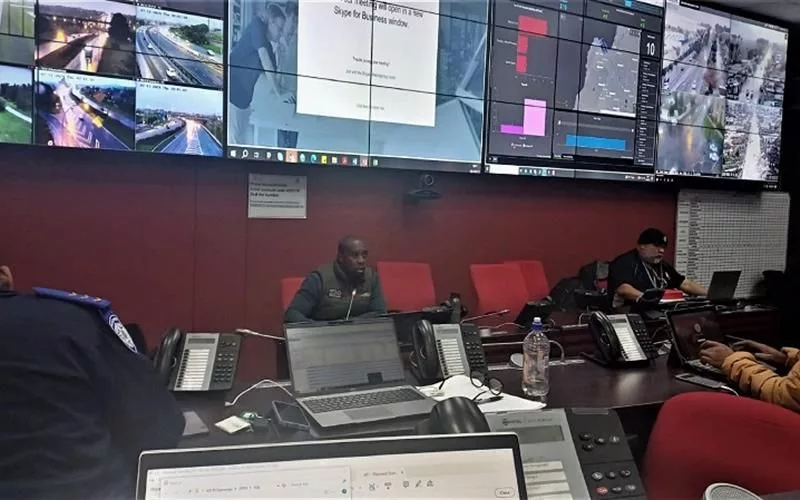Cape Town is facing heavy rain and wind storms, resulting in flooded roads, collapsed power lines, and fallen trees. However, the Disaster Coordinating Team, made up of various agencies, is working tirelessly to evaluate the situation and provide emergency responses. NGOs and businesses are also contributing to relief efforts, showcasing the city’s solidarity and tenacity in the face of adversity. Despite over 33,000 households being impacted, Cape Town’s spirit remains unbroken, with citizens and organizations donating generously to provide aid.
Cape Town’s integrated response unit is demonstrating remarkable solidarity and tenacity in the face of a series of heavy rain and wind storms. The Disaster Coordinating Team, comprised of various agencies, evaluates the situation, provides emergency responses, and conducts daily briefings to ensure a harmonized response. NGOs and businesses are also contributing to relief efforts, demonstrating Cape Town’s unity in the face of adversity.
Cape Town, a notable coastal city praised for its breathtaking aesthetics, has recently been plunged into an unusual atmosphere quite opposite to its regular sunny ambiance. For a turbulent span of six days, this magnificent city has been persistently battling with a series of unyielding heavy rain and wind, testing Cape Town’s celebrated tenacity.
The Storm’s Havoc and the City’s Unyielding Response
Venturing into the storm-laden streets could make one feel like they’ve stepped into a catastrophe film’s set—with inundated roads, collapsed power lines, and trees scattered all over the place. However, amidst the tumult, a glimmer of optimism persists—the City’s integrated response unit, demonstrating unwavering resolve to reinstate normalcy.
The Disaster Coordinating Team, comprised of various agencies, is committed to working ceaselessly, evaluating the situation, keeping an eye on service challenges, and providing relentless emergency responses. This team is a remarkable collection of representatives from multiple City departments, provincial and national government bodies, and even the SPCA. They conduct a minimum of four daily briefings to ensure a harmonized response to the storm’s effects.
Multifaceted Interventions and Beyond
Their endeavors to minimize the storm’s impact are diverse. The City’s Corporate Call Centre and Public Emergency Communication Centre handle service requests and emergency calls, guiding them to the suitable relief channels. The Roads Department and Water & Sanitation teams tirelessly clear obstructed roads and settlements. The Safety & Security enforcement services manage the closure of roads and associated impacts.
However, their initiatives extend beyond immediate relief. The Informal Settlements Management Branch carries out assessments and distributes flood kits, while the Disaster Risk Management sparks related departments into action. The Energy Department toils untiringly to restore electricity, and the Recreation and Parks Department clears trees and debris from impacted roadways. Their exertions will carry on until all service requests are addressed, even long after the storm has subsided.
The Storm’s Impact and a City’s Unwavering Spirit
The storm’s effect on the city’s inhabitants is indeed significant. Current evaluations by the Disaster Risk Management Centre and Human Settlements Department indicate that over 33,000 households have been impacted, affecting around 95,000 individuals across the city. This is where Cape Town’s spirit truly sparkles.
Local NGOs have been supplying humanitarian aid from the beginning of the storm, distributing meals, blankets, mattresses, beanies, roofing sheets, and hygiene packs. These organizations—Gift of the Givers, Islamic Relief, Ashraful Foundation, Living Hope, Mustadafin Foundation, and Al Imdaad—form the bedrock of the city’s relief efforts. Their endeavors are a testament to Cape Town’s unity in the face of challenges.
Generosity in Times of Adversity
As the city called for assistance, citizens and businesses responded by generously donating non-perishable food, personal hygiene products, diapers, baby formula, blankets, and construction materials. The public can contribute directly to their preferred NGO, or at identified drop-off locations at six fire stations, or through the Disaster Risk Management Centre Donations Line.
In an incredible demonstration of corporate social responsibility, supermarket chain Pick n Pay has placed donation trolleys at its storefronts, while the Community Chest has contributed blankets, with more support promised. These acts of generosity underscore the city’s united stand in the face of adversity.
As Cape Town fights against the stormy assault, the city’s resilience, unity, and steadfast spirit are remarkably apparent. The city and its citizens, backed by dedicated professionals, indefatigable NGOs, and charitable businesses, are enduring the storm. This is a testament to their mutual pledge to overcome adversity, a confirmation of the city’s tenacity and unity in tackling challenges head-on.
What is Cape Town facing currently?
Cape Town is currently facing heavy rain and wind storms, resulting in flooded roads, collapsed power lines, and fallen trees.
Who is working to provide emergency responses to the situation?
The Disaster Coordinating Team, comprised of various agencies, is working tirelessly to evaluate the situation and provide emergency responses.
What initiatives are being taken to minimize the storm’s impact?
The City’s Corporate Call Centre and Public Emergency Communication Centre handle service requests and emergency calls, while the Roads Department and Water & Sanitation teams tirelessly clear obstructed roads and settlements. The Disaster Risk Management carries out assessments and distributes flood kits, while the Recreation and Parks Department clears trees and debris from impacted roadways.
How many households have been impacted by the storm?
Current evaluations by the Disaster Risk Management Centre and Human Settlements Department indicate that over 33,000 households have been impacted, affecting around 95,000 individuals across the city.
How are NGOs and businesses contributing to relief efforts?
Local NGOs have been supplying humanitarian aid, distributing meals, blankets, mattresses, beanies, roofing sheets, and hygiene packs. Businesses such as Pick n Pay have placed donation trolleys at its storefronts while the Community Chest has contributed blankets.
How can the public contribute to relief efforts?
The public can contribute directly to their preferred NGO or at identified drop-off locations at six fire stations or through the Disaster Risk Management Centre Donations Line. People can donate non-perishable food, personal hygiene products, diapers, baby formula, blankets, and construction materials.













